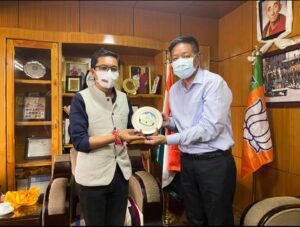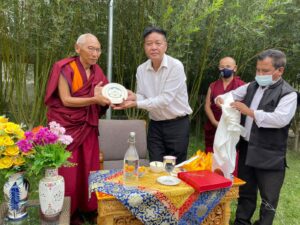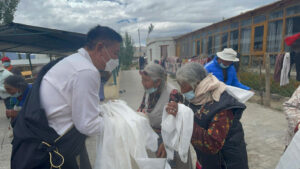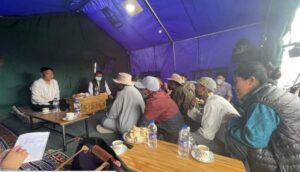
Sikyong with Honourable MP Jamyang Tsering Namgyal
Photo: Sikyong Facebook
Sikyong Penpa Tsering, the newly elected President of the Central Tibetan Administration (CTA), also known as the Tibetan Government-in-Exile,has embarked on his first official travel as Sikyong outside Dharamshala by visiting the Tibetan communities in Ladakh in the far north of India. Sikyong arrived in Sonamling Tibetan Settlement on August 20 to a warm welcome from the representatives of local associations and the public.
On his arrival, Sikyong visited the Tibetan Chief Representative’s office, the Office of the Federation Tibetan Co-operatives in India (FTCI), the local Tibetan Assembly, Tibetan Children’s Village (TCV) School, local Men-tsee-khang clinic, local Tibetan healthcare centre, local Tibetan Justice Commission and TCV Ladakh’s home for the elderly.
The following day, Sikyong visited the Duchik nomadic settlement and met the eight nomadic families whose livestock were affected by the recent outbreak of foot and mouth disease that has seen more than 1,200 goats and sheep destroyed over the last month, reports tibet.net, the official website of the CTA. Sikyong told them that the Tibetan community in exile has raised funds through crowdfunding to compensate for their losses, and that the local administration has offered to provide veterinary help. While expressing his gratitude to the donors, Sikyong advised the nomads to prepare in advance in case of further disasters in the future.

Sikyong and Kyabje Thiksay Rinpoche
Photo: Sikyong Facebook
Sikyong visited the Shey and Thiksey monasteries and received blessings from Thiksey Rinpoche.
Tibet.net reports that while speaking to the public and to the various representatives he met in Ladakh, he outlined his three main goals as Sikyong: the resumption of the Sino–Tibetan dialogue to resolve the Tibet issue, based on the Middle Way Approach envisioned by His Holiness the Dalai Lama; looking after the welfare of Tibetans in exile by strengthening the bond between the Tibetan public and the Central Tibetan Administration and, thirdly, reinforcing the Tibet cause on the global stage by meeting world leaders and diplomats.

Tibetans greeting Sikyong
Photo: Sikyong Facebook
Sikyong encouraged Tibetan community leaders to maintain productive relations with the local administration and dignitaries. He emphasised the importance of understanding the local situation before planning future projects, of keeping in mind the requirements of the population of the area and the potential benefits of the projects to the public.
Sikyong visited all 12 camps in the Sonamling settlement and Makhyu and Chushul nomadic settlements.
While visiting the settlement, he paid a visit to the family of Nyima Tenzin, a Tibetan soldier and member of the Indian Army’s Special Frontier Force, who died during the Sino–Indian clash on the Ladakh–Tibet border last year. He assured the camp leaders that he will share their grievances with the Ladakh Hill Council and with the Member of Parliament for Ladakh, and reassured them of the CTA’s continuous support and assistance.

Sikyong meeting the eight families of Duchik nomadic settlement
Photo: tibet.net
Penpa Tsering said that since assuming the role of Sikyong two and a half months ago he has focused on two main tasks – the resumption of the Sino–Tibetan dialogue and looking after the welfare of the Tibetan public, particularly the poor and elderly.
During his visit, along with representatives of Tibetan organisations in Ladakh, Sikyong met various local dignitaries, including Thupten Tsewang, former member of the Indian parliament and President of the Ladakh Buddhist Association, and Jamyang Tsering Namgyal, the honourable member of Indian Parliament from Ladakh. Meeting the Chairman and officials of the Ladakh Autonomous Hill Development Council, Sikyong extended his gratitude for their constant support for the welfare of Tibetans living in Ladakh and the Chairman assured Sikyong of his continued support for Tibetans living in his region.
Sikyong then travelled on to the Jhanthang (remote) regions of Ladakh to meet nomadic communities living there.
Penpa Tsering was sworn-in as the new Sikyong (President) of the Tibetan Government-in-Exile on May 27. However, Parliament has been unable to elect a Speaker and Deputy Speaker because of the unresolved issues around the impeachment earlier this year of the Justices Commissioners who conduct the swearing-in ceremonies for the Speakers. This in turn has prevented the new Sikyong from establishing his Kashag (cabinet). This ongoing parliamentary crisis has created much confusion and concern in the Tibetan exile community and has come to the attention of international supporters of the Tibetan cause. On August 2, Lisa Peterson, United States Acting Assistant Secretary of State, wrote to the Tibetan Parliament in Exile (TPiE), saying that failure by the TPiE to resolve the current parliamentary dispute risks “undermining the confidence placed by the Tibetan diaspora and the international community in the CTA and TPiE” and urging the TPiE to “move past their differences and turn to the pressing matters that need their attention”.
Stop Press:
On his return to Dharamshala, Sikyong unveiled a memorial statue of Nyima Tenzing near Tsuglagkhang, the main temple in McLeod Gang. During the ceremony, Sikyong spoke of the soldier’s sacrifice saying, “Nyima Tenzing was not the first to sacrifice his life for India’s security. Tibetan soldiers have made contributions and sacrifices for the Indian Army during India’s 1971 war with Pakistan as well as Kargil war. The martyr statue of the late Nyima Tenzing is build for commemorating all Tibetan soldiers who [have been] martyred for India’s security.”




 Print
Print Email
Email